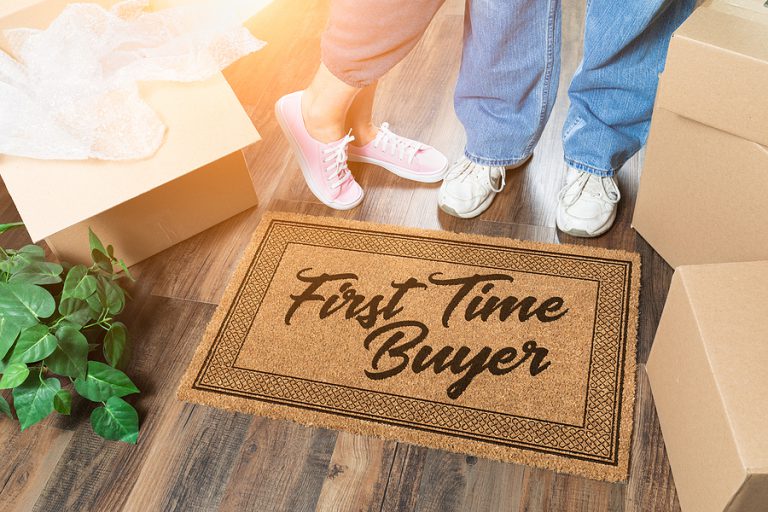
Understanding first-time home buyer loan requirements
You will have access to unique mortgage programs with low down payments and flexible guidelines if you’re a first-time home buyer.
You must fulfill all first-time home buyer loan requirements, which include things like income, credit score, and debt-to-income ratio, in order to benefit from these benefits. If you fulfill the first-time home buyer loan requirements, you might also be qualified for a grant that can assist with closing costs and your down payment.
All states offer these first-time home buyer grants, which offer a great chance for people with good credit but little money to realize their dream of becoming homeowners.
In this article (Skip to…)
First-time home buyer loan requirements
Plenty of home loan programs cater to first-time buyers. In order to accommodate borrowers with lower household incomes, credit scores, or down payments, many of these programs have more flexible eligibility requirements.
The following are the minimal prerequisites to be eligible for some of the most well-liked loans for first-time home buyers:
Not every one of the aforementioned guidelines is infallible. That’s because first-time home buyer loan requirements vary by program.
Moreover, none of the aforementioned government organizations actually underwrite the loans they make. Instead, borrowers will obtain financing through an approved lender. And each lender is allowed to set its own criteria.
However, here’s what you can generally expect:
- Debt-to-income ratio should generally not exceed 45%
- Credit scores should be 580 or above
- The down payment requirement is at least 3% of the total cost of the home purchase.
- Loan limits set a maximum loan amount based on program type and property location.
- Income limits determine eligibility for moderate and low-income individuals
- Although local restrictions on home purchase prices will differ, most places have maximum loan amounts of $.
- Refinancing options have their own requirements
These initiatives, which give flexible underwriting and options for down payments, give priority to low-income homebuyers.
As an illustration, suppose you are able to obtain an FHA loan with a credit score as low as 500, so long as you are able to make a 2010 percent down payment.
Alternatively, you may be able to get a Fannie Mae loan with a debt-to-income ratio of up to 49. 99% (must be below 50%) instead of 43%. However, to be eligible, you’ll need additional compensating factors (like a larger savings account).
So explore your loan options. It’s probably not as difficult as you might think to fulfill the standard first-time home buyer loan requirements, even if you have unique circumstances.
Specialty first-time home buyer loans
Certain homebuyers may be eligible for specific loan programs based on their location or line of work. There are first-time home buyer loan requirements associated with these specialized options that you must fulfill.
Conventional loans for first-time home buyers
First-time home buyers favor conventional mortgages because of their accessibility and flexibility. Here are a few programs:
- Conventional 2097: The Conventional 2097 loan is designed primarily for first-time buyers, but it’s not exclusive to them. It requires a down payment of only 3 percent. The loan must be for a single-family home, and the borrowers must have a credit score of at least 620.
- HomeReady: Designed for buyers with low to moderate incomes, Fannie Mae’s HomeReady loan It offers lower mortgage insurance premiums and necessitates a 3% down payment. Borrowers must complete an online homebuyer education course to qualify.
- Home Possible: Freddie Mac E2%80%99’s Home Possible assists low- and moderate-income home buyers by enabling down payments as low as 3 percent. Borrowers may be subject to income restrictions and must have a credit score of at least 620.
Remember that first-time homebuyers who pay less than 2020 in down payment must purchase private mortgage insurance (PMI). Once their loan-to-value ratio reaches 2788%, they can lower their PMI, which typically takes most new homeowners between 2 and 3 years.
Government-backed first-time home buyer loans
Government-backed loans are insured by the federal government, giving lenders greater peace of mind and frequently lowering the cost of these loans for first-time buyers. Understanding the first-time home buyer loan requirements that each government-backed option has is crucial to maximizing these benefits.
- FHA loans: The Federal Housing Administration backs these low-down payment loans, which only need a three-year 5% minimum. Additionally, compared to conventional loans, it offers more lenient credit score requirements, which makes this kind of mortgage a desirable option for first-time buyers. Nonetheless, for the duration of the loan, borrowers are responsible for paying mortgage insurance premiums (MIP).
- VA loans are available to veterans, active-duty military personnel, and surviving spouses through the Department of Veterans Affairs. VA loans can drastically lower monthly payments because they don’t require a down payment or mortgage insurance.
- USDA loans: The U. S. USDA loans are provided by the Department of Agriculture to homebuyers in rural and suburban areas who satisfy certain income requirements. These loans have competitive interest rates and offer financing with no down payment required (0%).
State and local first-time home buyer programs
First-time home buyer programs, including down payment assistance (DPA) loans and grants, closing cost assistance, and home buyer education, are frequently provided by state and local governments. Each of these programs has its own set of first-time home buyer loan requirements.
- DPA grants and loans: There are two types of down payment assistance available: grants and loans. Grants do not need to be repaid, but loans do, usually in tandem with the mortgage. While eligibility criteria can differ, they frequently include finishing a homebuyer education course and having a limited income.
- Closing cost assistance: To help with closing costs, a number of state and local programs provide loans or grants. Similar to DPA programs, these typically have requirements for borrowers, like income limits and being a first-time buyer.
- Home buyer education: Completing a home buyer education course is a requirement for many of these programs in order to be eligible for a first-time home buyer loan. These classes assist borrowers in comprehending the duties of homeownership, such as setting up a budget, taking care of a house, and knowing the conditions of their mortgage.
The prerequisites for obtaining a grant for first-time home buyers are contingent upon the down payment assistance schemes that are offered in your area.
Nationwide first-time home buyer loan programs
First-time home buyers across the nation have access to a range of options through nationwide home buyer programs. Certain programs are tailored to target specific demographics or facilitate the purchase of particular kinds of real estate, and they frequently have unique loan requirements for first-time homebuyers.
Let’s examine some of these programs in more detail, along with their particular loan requirements.
Good Neighbor Next Door
The U. S. Under the Good Neighbor Next Door program, run by the Department of Housing and Urban Development (HUD), public employees such as teachers, firefighters, EMTs, and law enforcement officers can receive substantial discounts on homes. Those who meet the eligibility requirements can get a discount of up to 50% off the list price of a home in revitalization areas. In exchange, the buyer has to promise to occupy the property full-time for 36 months. Although the requirements for this program are unique, it’s important to keep in mind that they may not match those of a standard first-time home buyer loan.
First-time buyers who intend to buy a HomePath property are targeted by Fannie Mae’s HomePath Ready Buyer program. Upon finishing an online course on homebuyer education, qualified buyers are eligible to receive up to 3% in closing cost assistance towards the purchase of a HomePath property. The homes included in this program are those that Fannie Mae has foreclosed on.
An Energy-Efficient Mortgage (EEM) is a federal program that enables home buyers to finance the cost of energy-efficient improvements to a new or existing home as part of their FHA, VA, or conventional home loan. This program is available to those who meet the requirements for first-time home buyers. The purpose of this program is to reduce utility costs in order to partially offset the increased cost of the mortgage. The improvements must be cost-effective, which means that the money saved on energy bills must exceed the improvements’ cost, in order for them to be eligible.
Native American Direct Loan (NADL)
Eligible Native American Veterans and their spouses can use their VA home loan guaranty benefit on federal trust land through the Native American Direct Loan (NADL) program, which is backed by the VA. Numerous advantages of the program include no down payment requirements, affordable interest rates, and minimal closing costs. The purchaser must plan to use the property as their principal place of residence.
Nonprofit and charitable organizations for first-time buyers
If you’re a low- to moderate-income first-time home buyer, you might be qualified for assistance from nonprofit or charitable groups. These organizations are not governmental, but they do provide helpful financial and educational resources to assist you in understanding the first-time home buyer loan requirements when you purchase your first residence.
Nonprofits typically have requirements and income limits that determine which kinds of home buyers are eligible for assistance.
Neighborhood Assistance Corporation of America (NACA)
Another nonprofit available across the U. S. is the Neighborhood Assistance Corporation of America (NACA). Serving families experiencing financial instability, NACA offers advice and education on mortgages. They work together with lenders who will help low-income families obtain their first mortgage.
What makes NACA unique is that their loan program offers potential homebuyers a customized way to fulfill first-time home buyer loan requirements because it doesn’t require a down payment, closing costs, or even a minimum credit score.
A well-known nonprofit organization worldwide, Habitat for Humanity is committed to providing “adequate, straightforward, and cost-effective” homes for low-income families. They enlist volunteers to build the homes, guaranteeing that the final cost is still less than alternatives available in the market after the closure. Thus, this could be a possibility to think about for more affordable housing if you meet their requirements and the first-time home buyer loan requirements.
Most charitable organizations and nonprofits are localized, just like many government initiatives. The U. S. Every state and county can access an up-to-date list of authorized nonprofit organizations maintained by the Department of Housing and Urban Development (HUD). Visit the HUD website to learn more about local housing programs that might assist you in refinancing or purchasing a property within five years.
Who is considered a first-time home buyer?
A person who purchases their first house is inherently a “first-time buyer.” ”.
However, repeat buyers occasionally meet the requirements to become first-time homebuyers as well, which entitles them to exclusive loan programs and financial aid.
According to Ryan Leahy, Sales Manager at Mortgage Network, Inc., “under most programs, a first-time home buyer is a person who has not had any ownership in the past three years.”
This three-year rule is used by nonprofits and local governments, who provide the majority of grants to first-time home buyers, to define first-time homeownership.
For “boomerang buyers” who previously owned a home but experienced a short sale, foreclosure, or bankruptcy, this is especially welcome news.
As long as they fulfill the relevant first-time home buyer loan requirements, these people have an easier time returning to homeownership under the three-year rule thanks to first-time home buyer grants and loans.
How to find first-time home buyer programs
One of the largest obstacles for a first-time home buyer is finding the money for the down payment and closing costs.
Fortunately, there are loans and grants available to assist people in purchasing a home.
Contacting the housing authority in the town or city where you wish to buy a home is the best way to find out if you qualify for their first-time home buyer loan.
Generally speaking, down payment grants, tax credits, and closing cost assistance are not promoted, so make sure to inquire around.
- Your realtor may be able to direct you toward regional grant opportunities. A seasoned real estate agent has probably assisted other borrowers who require a little assistance moving into their new residence.
- You can also get assistance with closing costs and a down payment from your loan officer. Specifically, they can recommend programs that the lender has previously used and is willing to work with.
- If you work in the public sector, ask your employer. Nonprofits can provide tax credits or grant programs in certain areas to support emergency medical technicians, teachers, or law enforcement personnel, for instance.
In order to learn about homeownership and mortgage borrowing, many grant programs have income-based requirements and mandate that borrowers complete a homebuyer education course.
It might take some independent research to find the resources at your disposal.
Advantages of meeting first-time home buyer loan requirements
Meeting the requirements for a first-time home buyer loan opens up a number of amazing advantages that increase accessibility to home ownership.
- Decreased down payments: One major advantage of fulfilling the first-time home buyer loan requirements is the lowered down payment requirements. For many first-time homebuyers, this lower initial financial commitment compared to conventional loans can make their dream of owning a home a reality.
- Competitive mortgage rates: Getting approved for a loan as a first-time home buyer frequently entitles you to reduced interest rates. Good credit holders will especially benefit from this, as it will mean easier to manage monthly payments and a smaller total repayment amount over the course of the loan. Competitive rates are available even to those with less-than-ideal credit, especially with FHA loans.
- Stable interest rates: Having access to fixed-rate loans is one of the pleasures of fulfilling these loan requirements. Fixed interest rates provide stability to your monthly mortgage payments, protecting you from market fluctuations and making financial planning simpler.
- Loan forgiveness and deferrals: After a predetermined amount of consistent repayment, some first-time home buyer programs also offer forgivable or deferred loans for assistance with closing costs and a down payment. This benefit lowers the upfront costs of buying a property and may result in significant long-term savings.
You can access these and other benefits by fulfilling the first-time home buyer loan requirements, which increases the likelihood of achieving home ownership and improves the financial situation.
Common mistakes when applying for a first-time home buyer loan
Starting a journey toward homeownership can be exhilarating as well as intimidating. As a first-time home buyer, it’s easy to make mistakes. In the long run, you can save time and money by fulfilling first-time home buyer loan requirements and being aware of potential pitfalls before you apply.
Not choosing the right mortgage loan program
Not fully comprehending the first-time home buyer loan requirements for the kind of program you’re applying for is a mistake that many first-time home buyers make. Knowing if the loan you’re getting is fixed-rate or adjustable-rate is important because it will affect how much you have to repay the loan. Additionally, knowing the minimum down payment needed, if mortgage insurance is necessary, and the types of properties you can buy (e.g. g. , single-family, duplex) are all vital details.
Not improving credit scores before applying
Neglecting to verify and raise your credit score prior to applying is another typical mistake. Your credit score affects both the interest rate you pay and your eligibility for a loan. If you put off building your credit, you might wind up paying more in interest than is necessary.
Not saving enough money to close the loan
Ultimately, a lot of first-time homebuyers do not have enough money saved for closing costs, down payments, and other housing-related expenses. While certain programs may not require a down payment, it is usually advantageous to have a substantial down payment in order to lower both the total upfront cost of the loan and your monthly repayment obligations.
FAQ: First-time home buyer loan requirements
A first-time home buyer loan is a type of mortgage intended exclusively for individuals making their first home purchase. These loans frequently have advantageous terms to increase accessibility to homeownership. Certain first-time home buyer loan requirements must be met in order to qualify; these requirements can change based on the lender and type of loan.
A first-time home buyer loan’s main prerequisite is that the applicant must be a first-time home buyer and must not have owned a property within the previous three years. Beyond that, the requirements differ based on the kind of loan. These extra loan requirements for first-time homebuyers may include income limitations, debt-to-income ratios, and minimum credit scores.
Indeed, some first-time home buyer loans are designed to accommodate borrowers with lower credit scores. For example, people with credit scores as low as 500 may be eligible for FHA loans; however, a higher score may result in more favourable terms. It’s crucial to speak with your lender to learn about all of the prerequisites for first-time home buyers’ loans, including those related to credit score.
Depending on the lender and the loan type you’re interested in, different income requirements may apply for a first-time home buyer loan. While some programs concentrate on your debt-to-income ratio, others set income limits. For information on the precise income-related loan requirements for first-time home buyers, speak with a housing counselor or your selected lender.
Yes, a down payment is required for the majority of first-time home buyer loan programs. However, the amount might be as low as 3. 5% if you choose an FHA loan, and certain programs provide eligible buyers with options for zero down payment or down payment assistance. When weighing your options for buying your first home, it’s important to comprehend the down payment requirements for first-time home buyer loans.
Finding a lender that offers these specific programs is typically required in order to apply for a first-time home buyer loan. Begin by researching local mortgage loan specialists such as credit unions, banks, or lenders. Get in contact with them to find out about their requirements for first-time home buyers’ loans and the application procedure.
Do you meet the first-time home buyer loan requirements?
A grant or loan may be your ticket to obtaining the first-time home buyer loan requirements, putting the dream of homeownership closer than ever.
To begin the process of purchasing a home, obtain a mortgage lender’s pre-approval.
This is a critical step that all prospective homeowners must take because it confirms your eligibility for a mortgage and helps you better understand how much you can afford to buy a house.



FAQ
What credit score is needed to buy a house for the first-time?
For the majority of conventional mortgages, first-time applicants must be approved with a credit score of at least 620. First-time homebuyers may still be able to qualify for a mortgage through FHA, VA, or USDA programs even if their credit scores are below the required minimum.
What type of mortgage is best for first-time buyers?
FHA Mortgage The Federal Housing Administration insures low-down payment mortgages (FHA) For first-time buyers who are not qualified for other low- or no-down payment options, they are a catch-all program.
Does NY have a first-time home buyer program?
In order to help them afford a home, qualified first-time homebuyers in New York can find mortgage and down payment assistance programs. Additionally, conventional and federally backed loans are available, and some buyers might find them suitable.
Is it a good idea to get a FHA loan?
First-time homebuyers or those with less than ideal credit histories are frequently advised to apply for FHA loans because they are frequently easier to qualify for, have more affordable mortgage rates, and require less cash up front to purchase a property.
Read More :
https://www.rocketmortgage.com/learn/first-time-home-buyer
https://www.nyc.gov/site/hpd/services-and-information/homefirst-down-payment-assistance-program.page
